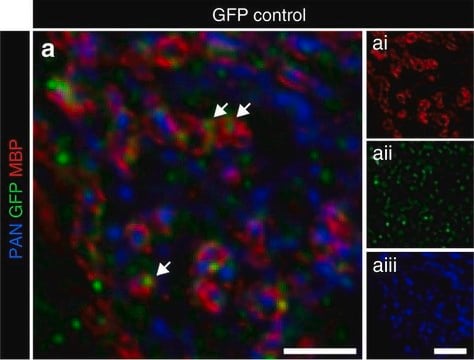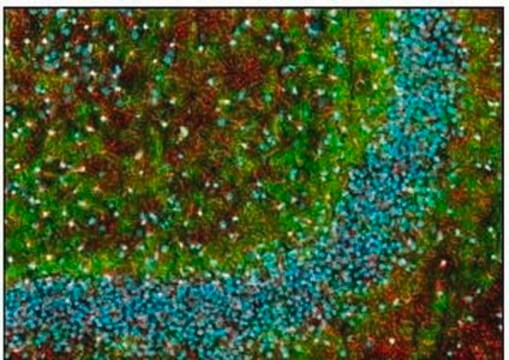MAB395
Anti-Myelin Basic Protein Antibody, a.a. 36-50, clone 14
culture supernatant, clone 14, Chemicon®
Synonym(s):
MBP
Sign Into View Organizational & Contract Pricing
All Photos(1)
About This Item
UNSPSC Code:
12352203
eCl@ss:
32160702
NACRES:
NA.41
Recommended Products
biological source
rat
Quality Level
antibody form
culture supernatant
antibody product type
primary antibodies
clone
14, monoclonal
species reactivity (predicted by homology)
mammals
manufacturer/tradename
Chemicon®
technique(s)
ELISA: suitable
immunohistochemistry: suitable
isotype
IgG2b
NCBI accession no.
UniProt accession no.
shipped in
wet ice
target post-translational modification
unmodified
Gene Information
human ... MBP(4155)
Specificity
Reacts with a synthetic peptide corresponding to human MBP sequence 36-50 as well as intact human MBP. Numbering of MBP residues is as described by Martenson (1984). Mapped by Geyson method to FFGGDR and RFFGGO region.
Immunogen
Bovine myelin basic protein.
Epitope: a.a. 36-50
Application
Detect Myelin Basic Protein using this Anti-Myelin Basic Protein Antibody, a.a. 36-50, clone 14 validated for use in ELISA, IH.
Immunohistochemistry (frozen sections)
ELISA
This antibody is also expected to work for Western blot. Specific testing has not been performed.
Optimal working dilutions must be determined by end user.
ELISA
This antibody is also expected to work for Western blot. Specific testing has not been performed.
Optimal working dilutions must be determined by end user.
Research Category
Neuroscience
Neuroscience
Research Sub Category
Neuronal & Glial Markers
Neurochemistry & Neurotrophins
Neuronal & Glial Markers
Neurochemistry & Neurotrophins
Linkage
Replaces: MAB395
Physical form
Tissue culture supernatant. Liquid containing 0.09% sodium azide.
Storage and Stability
Maintain at -20° in undiluted aliquots for up to 12 months after date of receipt. Avoid repeated freeze-thaw cycles.
Legal Information
CHEMICON is a registered trademark of Merck KGaA, Darmstadt, Germany
Disclaimer
Unless otherwise stated in our catalog or other company documentation accompanying the product(s), our products are intended for research use only and are not to be used for any other purpose, which includes but is not limited to, unauthorized commercial uses, in vitro diagnostic uses, ex vivo or in vivo therapeutic uses or any type of consumption or application to humans or animals.
Not finding the right product?
Try our Product Selector Tool.
Storage Class Code
12 - Non Combustible Liquids
WGK
WGK 2
Flash Point(F)
Not applicable
Flash Point(C)
Not applicable
Certificates of Analysis (COA)
Search for Certificates of Analysis (COA) by entering the products Lot/Batch Number. Lot and Batch Numbers can be found on a product’s label following the words ‘Lot’ or ‘Batch’.
Already Own This Product?
Find documentation for the products that you have recently purchased in the Document Library.
So-ichi Tamai et al.
The Journal of biological chemistry, 289(3), 1629-1638 (2013-11-28)
Amyotrophic lateral sclerosis (ALS) is a neurodegenerative disease characterized by the loss of motor neurons. Here we show that the basic leucine zipper transcription factor NFIL3 (also called E4BP4) confers neuroprotection in models of ALS. NFIL3 is up-regulated in primary
Anzari Atik et al.
Frontiers in physiology, 10, 990-990 (2019-08-21)
Caffeine is one of the few treatments available for infants with apnea of prematurity. As the recommended dosing regimen is not always sufficient to prevent apnea, higher doses may be prescribed. However, little is currently known about the impact of
Feng Mei et al.
Nature medicine, 20(8), 954-960 (2014-07-07)
Functional screening for compounds that promote remyelination represents a major hurdle in the development of rational therapeutics for multiple sclerosis. Screening for remyelination is problematic, as myelination requires the presence of axons. Standard methods do not resolve cell-autonomous effects and
Chrysanthy Ikonomidou et al.
Neurobiology of disease, 130, 104489-104489 (2019-06-09)
Sedatives and anesthetics can injure the developing brain. They cause apoptosis of neurons and oligodendrocytes, impair synaptic plasticity, inhibit neurogenesis and trigger long-term neurocognitive deficits. The projected vulnerable period in humans extends from the third trimester of pregnancy to the
Sharmony B Kelly et al.
Journal of neuroinflammation, 18(1), 189-189 (2021-09-02)
Increased systemic and tissue levels of interleukin (IL)-1β are associated with greater risk of impaired neurodevelopment after birth. In this study, we tested the hypothesis that systemic IL-1 receptor antagonist (Ra) administration would attenuate brain inflammation and injury in near-term
Our team of scientists has experience in all areas of research including Life Science, Material Science, Chemical Synthesis, Chromatography, Analytical and many others.
Contact Technical Service







